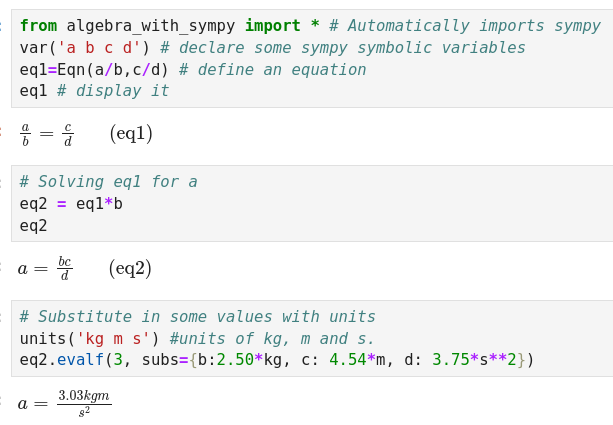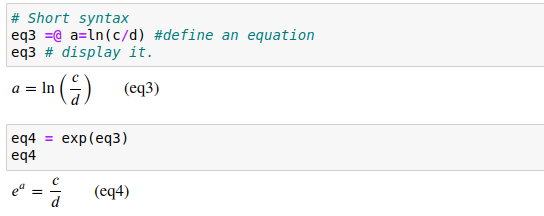# Algebraic Equations with SymPy
[Introduction](#introduction) | [Output Formatting](#controlling-the-format-of-interactive-outputs)
| [Installation](#setupinstallation) |
[Try Live](#try-in-binder) | [Issues or Comments](#issues-or-comments) |
[Change Log](#change-log) |
[License](#licensed-under-gnu-v3-licensehttpsgnuorglicenses)
| [GIT Repository](https://github.com/gutow/Algebra_with_Sympy)
| [PyPi Link](https://pypi.org/project/Algebra-with-SymPy/)
## [Website/Documentation (including API)](https://gutow.github.io/Algebra_with_Sympy/)
## Introduction
This tool defines relations that all high school and college students would
recognize as mathematical equations.
They consist of a left hand side (lhs) and a right hand side (rhs) connected by
the relation operator "=".
This tool applies operations to both sides of the equation simultaneously, just
as students are taught to do when
attempting to isolate (solve for) a variable. Thus the statement `Equation/b`
yields a new equation `Equation.lhs/b = Equation.rhs/b`
The intent is to allow using the mathematical tools in SymPy to rearrange
equations and perform algebra
in a stepwise fashion using as close to standard mathematical notation as
possible. In this way more people can successfully perform
algebraic rearrangements without stumbling
over missed details such as a negative sign.
A simple example as it would appear in a [Jupyter](https://jupyter.org)
notebook is shown immediately below:

The last cell illustrates how it is possible to substitute numbers with
units into the solved equation to calculate a numerical solution with
proper units.
In IPython environments (IPython and Jupyter) there is also a shorthand
syntax for entering equations provided through the IPython preparser. An
equation can be specified as `eq1 =@ a/b = c/d`.

If no Python name is
specified for the equation (no `eq_name` to the left of `=@`), the equation
will still be defined, but will not be easily accessible for further
computation. The `=@` symbol combination was chosen to avoid conflicts with
reserved python symbols while minimizing impacts on syntax highlighting
and autoformatting.
[More examples of the capabilities of Algebra with Sympy are
here](https://gutow.github.io/Algebra_with_Sympy/Demonstration%20of%20equation%20class.html).
Many math packages such as [SageMath](https://www.sagemath.org/)
and [Maxima](http://maxima.sourceforge.net/) have similar capabilities,
but require more knowledge of command syntax, plus they cannot easily be
installed in a generic python environment.
## Controlling the Format of Interactive Outputs
* **In graphical environments (Jupyter)** you will get rendered Latex such as
$\frac{a}{b} = \frac{c}{d}$. To also see the code representation (what can
be copied and pasted for
additional computation) set `algwsym_config.output.show_code = True`.
This will print the code version (e.g. `Equation(a,b/c)`) of the equation as
well. This code version can be accessed directly by calling `repr()` on the
equation.
* **In interactive text environments (ipython and command line)** the
representation (code version) is returned by default. Calling `print()`
or `str()` on an equation will return the human readable version with an
equals sign. To have the human readable version returned by default set
`algwsym_config.output.human_text = True`. If combined with
`algwsym_config.output.show_code = True`, both code and human readable
versions will be shown.
* **The equation label** can be turned off by setting
`algwsym_config.output.label = False`.
## Setup/Installation
1. Use pip to install in your python environment:
`pip install -U Algebra-with-SymPy`
2. To use in a running python session issue
the following command : `from algebra_with_sympy import *`.
This will also import the SymPy tools.
3. If you want to isolate this tool from the global namespace you are
working with change the import statement
to `import algebra_with_sympy as spa`, where
`spa` stands for "SymPy Algebra". Then all calls would be made to `
spa.funcname()`.
## Try in binder
[](https://mybinder.org/v2/gh/gutow/Algebra_with_Sympy.git/master/?urlpath=/tree/Demonstration%20of%20equation%20class.ipynb)
## Issues or Comments
* Issues and bug reports should be [filed on
github](https://github.com/gutow/Algebra_with_Sympy/issues).
* Comments, questions, show and tell, etc. should go in the [project
discussions](https://github.com/gutow/Algebra_with_Sympy/discussions).
## Change Log
* 0.10.0
* Documentation updates and fixes.
* Significantly increased test coverage (~98%).
* Support for `Eqn.rewrite(Add)`
* Solving (e.g. `solve(Eqn,x)`) now supported fully. Still experimental.
* Bug fix: latex printing now supports custom printer.
* Substitution for into an Equation using Equations is now
supported (e.g. `eq1.subs(eq2, eq3, ...)`).
* `algebra_with_sympy.__version__` is now available for version checking
within python.
* Bug fix: preparsing for `=@` syntax no longer blocks `obj?` syntax for
getting docstrings in ipython.
* More robust determination of equation names for labeling.
* 0.9.4
* Update to deal with new Sympy function `piecewise_exclusive` in v1.11.
* Added user warning if a function does not extend for use with `Equations`
as expected. This also allows the package to be used even when a function
extension does fail.
* Simplification of documentation preparation.
* Typo fixes in preparser error messages.
* 0.9.3
* Added check for new enough version of IPython to use the preparser.
* If IPython version too old, issue warning and do not accept `=@` shorthand.
* 0.9.2
* `=@` shorthand syntax for defining equations in IPython compatible
environments.
* Fixed bug where `root()` override called `sqrt()` on bare expressions.
* 0.9.1
* Equations labeled with their python name, if they have one.
* Added flags to adjust human readable output and equation labeling.
* Accept equation as function argument in any position.
* First pass at `solve()` accepting equations.
* Added override of `root()` to avoid warning messages.
* More unit tests.
* First pass at documentation.
* 0.9.0 functionality equivalent to extension of SymPy in
[PR#21333](https://github.com/sympy/sympy/pull/21333).
## [licensed under GNU V3 license](https://gnu.org/licenses)
This program is free software: you can redistribute it and/or modify
it under the terms of the GNU General Public License as published by
the Free Software Foundation, either version 3 of the License, or
(at your option) any later version.
This program is distributed in the hope that it will be useful,
but WITHOUT ANY WARRANTY; without even the implied warranty of
MERCHANTABILITY or FITNESS FOR A PARTICULAR PURPOSE. See the
GNU General Public License for more details.
Copyright - Jonathan Gutow 2021, 2022




